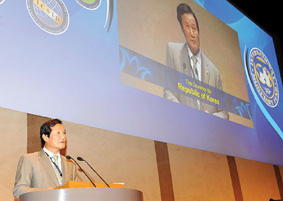Korea Calls for IMF Quota Reallocation
Minister Yoon urges quota increase for underrepresented countries at the Istanbul IMF/World Bank annual meetings
 Minister Yoon Jeung-hyun of the Ministry of Strategy and Finance led the Korean delegation to the annual conference of the IMF and the World Bank held in Istanbul, Turkey on Oct. 3-4. Minister Yoon, in his speech at the meeting, called for increased quotas for underrepresented countries and joint exit strategies from the economic crisis. The IMF board of directors approved the quota increase for underdeveloped countries by transferring 5 percent of the quotas for advanced member countries to them.
Minister Yoon Jeung-hyun of the Ministry of Strategy and Finance led the Korean delegation to the annual conference of the IMF and the World Bank held in Istanbul, Turkey on Oct. 3-4. Minister Yoon, in his speech at the meeting, called for increased quotas for underrepresented countries and joint exit strategies from the economic crisis. The IMF board of directors approved the quota increase for underdeveloped countries by transferring 5 percent of the quotas for advanced member countries to them.
The significance of the Istanbul meeting was that it reconfirmed the agreement reached at the Pittsburgh G-20 Summit to reset the IMF quotas for its member countries with quota increases for underrepresented countries by January 2011.
Minister Yoon had a one-on-one meeting with Gov. Robert Zoellick of the World Bank on the sidelines of the Istanbul meeting. The World Bank governor asked about the outlines of important issues to be discussed at the G-20 Summit scheduled to be held in Korea next fall as well as Minister Yoon¡¯s opinion on the exit strategies envisioned by some Southeast Asian countries. Yoon replied that the G-20 Summit would take up such issues as detailed implementation plans for the sustainable economic growth of the world economy. He also said the exit strategies should be steady and step-by-step as the speed of the economic recovery for each country is different.
Yoon also stressed that Korea¡¯s voting rights should be increased in tandem with its economic growth scale when the World Bank reforms its governance structure. Yoon also promised Korea¡¯s intention to participate in the World Bank¡¯s capital increase.
Excerpts of Minister Yoon¡¯s speech are as follows: ¡°At this juncture, I would like to make the following suggestions to overcome the crisis and ensure sustainable growth:
First, exit strategies need to be prepared, but they should be implemented when recovery becomes fully secured.
The premature implementation of exit strategies may impede the emerging recovery and cause the economy to fall into a double-dip recession. Too late an implementation may give rise to market uncertainties and bring about another bubble.
In this regard, the strategies should be developed in a concerted manner based on internationally-agreed-to principles, and we should recognize that the scale, timing and sequencing of implementation will vary across countries. To this end, I would like to call on the IMF to promptly establish the criteria for exit strategies, and come up with specific solutions to provide even-handed, candid and independent surveillance on member countries. Second, sustainable and balanced economic growth should be pursued by our elaborated and coordinated efforts.
For the global economy to return to a pre-crisis level of trend growth, we have to reject protectionism and develop orderly policy coordination. Countries with a current account deficit should increase government and private savings while keeping the market open. Those with a current account surplus should take further actions to increase domestic demand and openness.
To make these successful, it is essential that we expand the global safety net for developing and emerging economies, particularly vulnerable to external shocks. Specifically, currency swap arrangements and regional financial cooperation during the global crisis, resulting in significant changes to the world economic order, the IMF and the World Bank need to improve credibility and legitimacy through reforms. In particular, the IMF needs to secure sufficient resources to respond to the economic crisis through a quota increase of at least 100 percent. Also, as agreed at the Pittsburgh G20 Summit, at least 5 percent of IMF quota shares should be realigned to underrepresented countries based on the economic weight of member countries.
The World Bank should also reflect countries¡¯ evolving economic weight in its shareholding realignment, which has not been carried out for a decade. In addition, the shareholding of member countries should be periodically reviewed.
Korea will also take active part in the IMF¡¯s Poverty Reduction and Growth Trust (PRGT)* and the World Bank¡¯s Vulnerability Framework, totaling about $780 million in loans and $24 million in contributions, the minister said.
There is a saying that ¡°One swallow does not make a summer.¡± We are beginning to see a glimmer of light in the global economy, which had been in a deep tunnel.
To make this light grow brighter, the sense of togetherness we have built so far must be further enhanced.
I hope the IMF and the World Bank will play a central role in enhancing the global coordination under the spirit of the sense of togetherness. As the Chair of the G20 in 2010, Korea will earnestly support the IMF and the World Bank in fulfilling their roles.¡± nw
Minister Yoon Jeung-hyun of the Ministry of Strategy and Finance delivers a speech at the IMF-World Bank annual meeting held in Istanbul, Turkey, Oct. 3-4.
3Fl, 292-47, Shindang 6-dong, Chung-gu, Seoul, Korea 100-456
Tel : 82-2-2235-6114 / Fax : 82-2-2235-0799